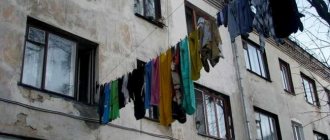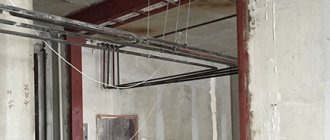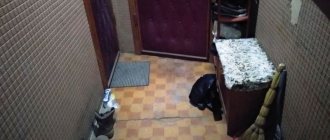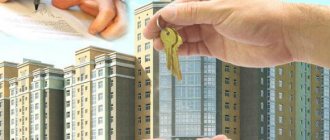In our country, many people are faced with facts of hidden or open fraud, which is one of the forms of deception, as a result of which a person is deprived of funds or movable/immovable property. Fraud often also means the taking of someone else's property by providing false information and deliberately misleading a person (victim). With all this, the form of deception can be very different, ranging from oral beliefs and agreements to the signing of false documents based on falsified facts. The police and prosecutor's office investigate these facts, but the court makes a decision.
| You can easily solve any legal problems with the help of lawyers registered on the site - you set the price for completing the task (consult, draw up a claim, file a complaint, etc.), and the lawyers submit applications for your task, you just have to choose the best one. Leave a task: | |
What types are prohibited?
Of course, renovations in an apartment are the legal right of the owner.
The main thing is not to violate the rules of the current legislation and carry out permitted repair work. If in doubt, it is better to immediately contact the BTI. Employees of the institution should advise on what work is considered legal and will help coordinate permitting documents.
In particular, if there is no agreement with the BTI, the following work is prohibited:
- making changes to the load-bearing partitions of the building;
- arrangement of additional bathrooms or toilets;
- conversion of residential premises into non-residential premises;
- reconstruction of window sills.
There is a list of changes that absolutely cannot be made:
- disassemble external walls to combine the balcony and living space;
- transfer the heating system to the loggia;
- increase the area of the bathroom or bathroom, while reducing the living space;
- making changes that significantly increase the load on the floors between floors.
Important! For illegal conversion of an apartment, the violator faces a fine established by Art. 7.21 Code of Administrative Offenses of the Russian Federation.
| Sum | Base |
| 1-1.5 thousand rubles. | In case of unauthorized redevelopment in residential buildings |
| 2-2.5 thousand rubles. | When carrying out redevelopment in a multi-storey building |
Also, unauthorized redevelopment can cost human lives.
According to the current Housing Code, legislation and regulations, homeowners are prohibited from making the following changes to the structural and architectural features of buildings:
- Demolition or dismantling of load-bearing walls, structures and ceilings.
- An increase of more than 25% in the total area of the kitchen or bathroom at the expense of the living space.
- Arrangement of an arch between the kitchen and living room in the presence of a gas stove.
- Expanding the area of a balcony or loggia at the expense of a room. At the same time, the arrangement of an arch leading to the balcony is not prohibited if the passage width does not exceed 1 meter.
- Installing a bathroom and other plumbing equipment in places not intended for this. Unauthorized replacement of pipes, heating radiators and other engineering and technical equipment operating from public utilities.
Legislation
- The Code of the Russian Federation on Administrative Offenses No. 195-FZ of December 30, 2001, in Article 7.21, establishes fines for illegal changes to the layout of an apartment.
- The Housing Code of the Russian Federation No. 188-FZ dated December 29, 2004, in articles 29, 26, 25, speaks of permissible alterations and provides for liability for them.
- Decree of the State Construction Committee of the Russian Federation dated September 27, 2003 No. 170 lists the rules for the technical operation of residential buildings.
- Building regulations 54.13330.2011 prohibit rearranging rooms, kitchens, and bathrooms.
- SanPiN 2.1.2.2645-10 requires not changing the openings of bathrooms, not combining adjacent rooms, and determines the permissible room sizes and lighting conditions.
- Technical regulations for fire safety No. 122-FZ dated July 22, 2008 prohibit the removal of gas equipment and the installation of open hearths and wood-heated fireplaces in apartments.
To which authorities can you complain?
If citizens become aware that illegal redevelopment of the home is being carried out in a neighboring apartment, then they need to take immediate action - inform one or more supervisory authorities about the illegal redevelopment of their neighbors.
Let's find out where you can turn to solve a complex issue.
Management companies are obliged to respond to incoming requests from citizens and conduct appropriate checks. Company employees send a written notice to the property owner, indicating the date and time when the commission should arrive for inspection.
| The owner of the apartment allowed members of the commission to inspect the home | The owner will show the existing approvals with the relevant authorities if we are talking about such repairs. Or he will demonstrate the work carried out for which permission was not required. For example, neighbors heard noise and clatter as the interior doors were being changed. |
| The commission was not allowed in for inspection | In this case, an act of refusal of the property owner for inspection is drawn up. Management company employees send a complaint on their own behalf to the Housing Inspectorate so that they can further resolve this problem. |
In order for the supervisory authorities to act sooner, it is necessary to enlist the support of other neighbors who fear that repair work is being carried out without approval. Authorities respond more quickly to collective appeals from citizens.
Housing staff must conduct their own inspection to reach a verdict. To do this, they draw up a notice indicating the date and time of the commission’s arrival and send it to the apartment owner. If the property owner does not provide access on the appointed date, he will be notified again.
| The commission was allowed into the apartment | If illegal actions of the property owner are detected, an authorized employee will draw up a protocol, and the violator will be given a fine of 2,500 rubles. After this, the owner of the premises is given 4-6 months to legalize the redevelopment. |
| The commission was unable to inspect the premises | Such situations are extremely rare, since it is considered a malicious violation to prevent the commission from entering the home. If this happens twice, then the authorized group draws up a report in each case, the object is removed from control, and the case based on the unlawful fact is sent to court. The defendant will be summoned to court, and then the trial will begin. If it is proven that the repairs are prohibited, the owner of the apartment will be forced to return everything to its original form. |
If the housing commission does not find any violations on the part of the residents, and you are still afraid of the construction, then there are other authorities where you can complain.
To the prosecutor's office
Prosecutor's offices are obliged to respond to citizens' appeals if the topic of the appeal relates to their powers. Apply only after other attempts have been made to resolve the dispute.
With the application, citizens must provide an official response issued by the Housing Inspectorate.
If an inspection of the apartment was carried out, then an inspection report must be attached. In the case where representatives of the housing estate were not allowed into the facility, then - an act of refusal of inspection.
A written appeal can be submitted in several ways:
- personally transfer to the office of the institution;
- send by registered mail with notification.
Upon receipt of an application, prosecutors will conduct an investigation. The outcome of the case will depend on the facts discovered during the examination.
| When identifying a threat of building collapse, as well as a possible danger to human life and health | The prosecutor's office will forward the case to the police to initiate criminal proceedings and bring the offender to justice in accordance with the norms of the Criminal Code of the Russian Federation. Only the court can determine the degree of guilt and assign punishment. |
| If it is determined that the repair was carried out competently, but without approval | The case will be sent to court so that the justice authorities can issue an order to eliminate the identified violation. In addition, the culprit will have to pay a fine. |
Contacting the prosecutor's office is a serious step; if a citizen does not have legal knowledge, then he may not make reference to the rules of the law, but it is necessary to provide evidence that there is a violation of construction standards. This could be photographs with cracks appearing on the walls, liquid leaking in places where this could not happen, testimonies of other witnesses, etc.
To court
Both supervisory authorities and the citizen himself can appeal to the judicial apparatus. There is no need to delay this issue, since while the authorized structures are carrying out inspections, the owner of the apartment can sell the property, and the new owner is not responsible for his actions.
Attention! Citizens who decide to go to court on their own must attach responses from the housing estate and the prosecutor’s office to their application to prove that the procedure for pre-trial settlement of the controversial issue was followed.
The claim must be accompanied by other available evidence, for example, certificates of the condition of the premises before the start of repair work or the conclusion of an independent examination. If, as a result of illegal redevelopment, a neighbor caused material damage (a leaking pipe, damaged furniture or new repairs), then an expert opinion on the cost of the damage caused will be required.
Where and where to file for divorce
Any expression of the will of one of the spouses to dissolve the marriage must be expressed in the form of a written statement. According to current legislation, marriage relations can be dissolved through two bodies - through the registry office or through the court. In this case, both the magistrate and the district (city) court can make a decision on divorce. In each case, you must meet a number of conditions necessary to apply to one or another authority, which are set out in the summary table below.
| Where to submit the application and documents | Submission conditions |
| At the registry office |
|
| To the world court |
|
| To the district court |
|
In addition to determining the body authorized to resolve the application for divorce, it is also necessary to determine its location. Violation of the jurisdiction rule will result in a refusal of the divorce by the registry office and the return of the claim by the court.
When contacting the registry office:
- at the place of marriage registration;
- at the place of residence of one or both spouses.
When going to court:
- at the defendant’s place of residence;
- at the place of residence of the plaintiff, if a minor child lives with him.
Where to complain if neighbors do illegal redevelopment
The law prohibits any actions that could lead to a deterioration in the quality of housing of neighbors. For example: cracks appeared in the walls, dampness and mold appeared on the floor and ceiling.
Free HOTLINE:
Moscow 7 (499) 938 5119
St. Petersburg 7 (812) 467 3091
Fed 8 (800) 350 8363
- the time of their implementation;
- procedure for removing construction waste;
- describes materials that can be used.
In the apartment
Some types of apartment renovation may be permitted by regulatory authorities after completion. However, there are changes that will not be considered legal:
- Conversion of housing into shops, offices, warehouses, saunas - in this case, a preliminary assessment of the condition of the building and its systems is required. It is done by organizations - the authors of the house project. Most often these are research institutes.
- Destruction of walls that provide strength and stability of the structure, including additional entrances and exits, window extensions.
- Removal of ventilation ducts and shafts.
- Placing equipment whose weight increases the load on the floor, water supply, and power supply. For example, installing industrial washing machines, replacing gas stoves with electric ones.
- Moving the heating system to the balcony.
- Use for heating floors of central water supply.
- Violations of sanitary, fire, and construction regulations.
- Combining the kitchen and rooms if a gas stove is installed. In this case, a partition between them is required.
- Placement of electrical wiring in the joints of the building.
- Swap kitchens, bathrooms and rooms.
- Make openings and niches in the walls of neighboring apartments, if they are not intended to be combined.
Also, you cannot enter the toilet through the kitchen or room. Such a change is allowed if a wheelchair user lives in the apartment. Residents of the first and last floors can occupy part of the attic and basement, but only if all the neighbors do not object. It is allowed to make a larger bathroom at the expense of a corridor or storage room, provided that high-quality waterproofing is carried out.
In non-residential premises
Redevelopment of non-residential premises of an apartment building requires mandatory permission from regulatory authorities. The main evaluation criterion is the safety of residents. Prohibited:
- Equipping entrances from the street through widened window openings.
- Actions that destroy the foundation.
- Placement of saunas and swimming pools in residential buildings.
- Reducing the distance between external and internal entrance doors.
- Restricting access to taps, valves, pipes that allow you to shut off water and gas during emergencies.
If the changes do not pose a threat to residents, they are recognized as legal subject to the necessary conditions.
In this case, the management company and homeowners association will help. Internal changes to the apartment must not violate the rights of other residents. It will not be possible to enter your neighbor’s apartment without his consent; only the court can give permission for such actions.
The organization’s specialists can visit apartments during scheduled events: when checking water meters, electricity, gas equipment. A neighbor's complaint will serve as a basis for checking the apartment, but will not allow entry without the owner's permission.
If supervisory agencies are inactive, you need to contact higher authorities. Copies of all requests and responses to them should be kept. This rule applies to all departments, organizations, and courts.
Utility services are supervised by housing inspectorates, administrations, and Rospotrebnadzor. Housing Housing Inspectors are controlled by the Chief Housing Inspector. The prosecutor's office checks for any violations of people's rights. District prosecutors report to city, regional, and federal officials. The courts also have supervisory authorities - regional, regional, republican, and the Supreme Court of the Russian Federation.
According to the norms of the Housing Code of the Russian Federation, there are a number of changes in residential premises, the implementation of which is not subject to approval and legalization. You cannot obtain permission in the following cases:
- If the redevelopment leads to a deterioration in the operating conditions of the house and people’s living conditions.
- If the modified premises and/or adjacent premises in the prescribed manner can be classified as unsuitable for habitation.
- If the redevelopment may affect premises that are registered with the headquarters for civil defense and emergency situations, and there is no appropriate permission to carry out this work.
- If, as a result of the work, the strength and stability of the load-bearing structures of the building may be impaired, which may lead to their destruction.
- If control and/or shutdown devices are installed on general apartment (common building) utility networks, when their use affects the amount of resource consumption in adjacent rooms.
- When the project involves reducing the cross-section or completely eliminating natural ventilation channels.
- When the loads on the load-bearing structures of the building seriously increase and exceed the permissible values according to the design (for example, when installing partitions made of heavy materials instead of partitions made of light materials, installing screeds in floors, placing additional equipment, etc.).
In standard residential buildings it is not allowed:
- Cutting niches, creating openings, punching holes in diaphragm walls, pylon walls and columns (pillars, racks), as well as in places where connections are located between prefabricated elements.
- Construction of additional openings in wall panels of adjacent height rooms without coordination with the design organization.
- Installation of grooves under internal wall panels and in horizontal joints, as well as in floor slabs and wall panels for placement of electrical wiring or piping.
Responsibility
The person who carried out the redevelopment will be responsible for the redevelopment. In 2020, the Supreme Court decided that it is impossible to punish a homeowner who received an apartment with illegal changes.
For such violations, a fine of 2,500 rubles is provided for citizens and up to 1 million rubles for organizations. Paying it does not relieve you from the obligation to legalize the redevelopment or return the housing to its original form, in particular, to demolish the erected brick partitions and terraces.
If the owner of the premises refuses to comply with the requirements of the court or supervisory authorities, the apartment can be sold at auction, after which the owner can be evicted. The owner will receive part of its price. Work to eliminate violations will be paid from the cost of the sold property.
An exceptional penalty may be imprisonment of up to 12 years if the building collapses.
Fine. The fine is imposed by the housing inspectorate. (The fine amount is from 25 minimum wages).
Obligation to obtain appropriate permission. Remember, paying a fine does not relieve the owner of an apartment with illegal redevelopment from the obligation to coordinate the changes made in the configuration of the residential premises. The housing inspection also issues an order to the violator, which specifies the exact period within which he must issue a permit. If the order is ignored, the owner will be fined again. (The amount of the fine in this case will be at least 80 thousand rubles).
Lansky Valery. Woman with a sledgehammer. 2011
The requirement to restore the premises to their original condition. If it is not possible to legalize the redevelopment made due to the non-compliance of the changes made with SNiP standards, then the owner of the premises will be fined and obliged to return everything to its place and restore its original appearance.
Selling an apartment at auction. If the order of the housing inspection is ignored and the redevelopment carried out is evaded, in accordance with the norms of the Housing Code of the Russian Federation, the court has the right to put the apartment up for auction. After the sale of the apartment, the owner will be returned part of its value minus legal costs and expenses for bringing it to its original condition.
Answer
There is exactly 1 year to address a complaint from the moment of violation of rights and freedoms. If the documentation was accepted by the apparatus, the person must notify the results within 10 days. We are talking about acceptance/refusal of an application, but not about consideration of the act.
The law does not establish a time frame for the proceedings; they can take months. In 2020, out of 43 thousand applications, only about 3,000 were considered.
Nevertheless, the apparatus is obliged to notify the applicant that the act has been accepted for consideration. The deadlines in the ECHR are not regulated in any way; the body is extremely busy. The applicant can wait a year, five or even ten years.
If the answer comes, but the applicant is not satisfied with the result, do not give up - there are other ways to fight for justice. This applies to both the judicial system of the Russian Federation and other supervisory authorities.
Idea and implementation
In the case of the “primary” - that is, with the purchase of housing in a new building - the question of where to start with the design of redevelopment of the apartment, the procedure for remodeling disappears in principle. The situation in the secondary real estate market is much more complicated.
After all, here often, when buying an apartment of typical Soviet-era construction, and even more so in the so-called “old building”, the future owner plans various alterations. But not all the buyer’s fantasies can be legally brought to life!
Imagine that you bought an apartment and, for some reason, the geometry of the living space no longer satisfied you. A team of workers knows how to arrange the redevelopment of an apartment on their own, but not in the BTI.
But you also need to remember the rules for remodeling apartments:
- if you are not the architect or designer of this particular building - can you carry out your plan safely? Will the building collapse?
- redevelopment that is not registered with the inventory bureau does not carry with it criminal or even administrative liability. There is only one “BUT” - if you are not going to sell, donate, or bequeath this apartment;
- very often, unauthorized redevelopment leads to disruptions in the normal functioning of engineering systems and communications;
In any transaction related to the alienation of a property, illegal redevelopment in the apartment can become a very significant “stumbling block”!
Step-by-step instruction
How to register the privatization of an apartment? And where to submit documents for privatization of an apartment? The procedure for privatizing an apartment can be divided into several stages:
This is interesting: Maternity capital for 3 children in St. Petersburg in 2019 amount
- Where to privatize an apartment? If you have the verbal consent of all residents, you must contact the MFC to fill out an application for transfer of ownership of the apartment. There you can get a list of all documents.
Contact the BTI housing privatization department. Necessary for inspecting the apartment and obtaining a technical passport for the apartment. If redevelopment of housing was carried out, this must be reflected in the passport. The request will cost 1000 rubles.
Collection of documents . What do you need? Some of the documents will be provided when you contact the MFC:
- social tenancy agreement and apartment warrant;
- cadastral passport, which will indicate the value of the property according to government experts, as well as some of its characteristics. You can register it at the MFC or the Cadastral Chamber. The cost of the request is 200 rubles;
- an extract from the house register about all living residents. The document has a validity period of 14 days;
- certificate of no debt for housing and communal services. Formally, there is no prohibition on preventing the transfer of property due to debt for housing and communal services. But many officials do not issue certificates without repaying the debt. In this case, citizens can sue;
- an extract from Rosreestr stating that the housing does not belong to anyone except the state. The request price will cost 200 rubles. The document is valid for 30 days;
- certificate of non-participation in the privatization process. If the participants were registered in the apartment after 1991, an extract from the house register from the previous places of registration is needed;
- a certificate from the Unified State Register of Real Estate in form No. 3 about the ownership of other property by each family member. Price – 200 rubles.
Documents that you will have to collect yourself:
- passports and birth certificates for persons under 14 years of age;
- marriage or divorce certificate;
- if there are persons who have refused privatization, a document of refusal drawn up by a notary is required.
When children participate in the privatization, the written consent of guardians or parents .
If the housing is for official use, another document is needed - permission from the organization at whose disposal the property is located to transfer ownership to the residents.
Transfer of documents for privatization . How long does it take to privatize an apartment? How long to wait for the result? The review process takes about two months.
Signing an agreement on the privatization of real estate. At this stage, all participants must be present. If this is not possible, you must issue a notarized power of attorney to carry out the operation. Without this, privatization cannot be carried out. A notarized power of attorney can be issued for 1000 rubles.
After privatizing an apartment, where should I take the documents? Where can I get ready-made documents on the privatization of an apartment?
- The final stage is registration of property in Rosreestr . Only after registering the property with this body, the process of transferring property into private hands will be completed. The state fee for privatizing an apartment will be 2,000 rubles. How long does it take? Registration takes place within a month.
How much does it cost to privatize an apartment ? If you decide to turn to real estate agency specialists to transfer ownership of your home, this process will not be free.
With regular privatization, you will have to pay about 10 thousand rubles, with accelerated privatization - 20 thousand rubles, and when transferring problematic real estate into ownership - up to 30 thousand rubles.
In what cases should you file a complaint?
It is difficult to detect the redevelopment of someone else's apartment. Questions arise when neighbors are faced with the consequences of repairs:
- long-term operation of construction tools - hammer drills, saws;
- a large amount of garbage;
- the appearance of cracks in the walls;
- sewer leaks;
- ventilation disturbance.
Projects of apartment buildings assume that neighbors share the same amount of water, gas, and electricity. Unauthorized connections and changes to systems may violate the rights of others.
They're tearing down the walls
Demolition of walls between rooms can lead to various consequences, for example, deflection of interfloor ceilings. Sanitary standards for the area of rooms and bathrooms are provided. Increasing the size of rooms and additional openings in load-bearing walls can affect the stability of the entire building and lead to its destruction. It is prohibited to demolish them.
Ventilation shafts run from the first to the last floor; they allow the air in the rooms to be renewed. Any changes to their design can lead to gas accumulation in apartments and the appearance of dampness. Such violations can be proven after inspection of neighboring housing by specialists from supervisory agencies.
Such redevelopment can cause problems associated with water and sewage leaks. If, after renovations carried out by neighbors, dampness appears in the rooms and this is not due to natural causes, you should find out whether one of the residents has had their kitchen or bathroom moved.
Sewer risers are located throughout the house. Their movement may impair system performance for other residents. It is possible to detect illegal repairs carried out by neighbors if regular blockages occur and waste flow worsens.
Where to start designing?
Any serious work on redevelopment of residential premises requires approval from the relevant supervisory authorities. No one demands fixing minor changes, such as converting a pantry into a dressing room or removing mezzanines.
But everything related to changes in the geometry of the room, regarding load-bearing and capital structures, must be agreed upon.
Let's look at a standard algorithm for remodeling an apartment.
Where to contact?
Apartment redevelopment: where to go? To record the redevelopment work carried out, you must contact the regional inventory bureau, which specializes in recording residential or commercial real estate.
First, you need to know who is involved in the redevelopment of apartments.
Depending on the region, organizations of this type may have different names:
- Bureau of Technical Inventory (BTI).
- PIB (design and inventory bureau).
- State Cadastre Service.
Who to leave minor children with?
All questions regarding the divorce procedure in the presence of minor children are resolved in court. Spouses cannot decide with whom their child will live? The judge has the right to reserve this decision. Teenagers themselves can express their desires about who they want to live with. But as for kids, very often their opinion remains unheard.
Whether a son or daughter will receive the surname of their mother or father depends on their wishes. Divorce of spouses directly affects children. The judge will try to give time for reconciliation first.
It is necessary to submit documents and a statement of the established form. The application for divorce must be correctly drawn up . We need documents prepared by the guardianship and trusteeship authorities. They contain an assessment of the conditions in which the baby will live. The judge also takes this data into account when determining the child’s place of residence. Find out more about what other documents are needed to file for divorce?
When you have children, divorce is difficult. As for common property, things are even more complicated.
- If the value of the property is up to 100 thousand rubles, then the case is resolved in the magistrate’s court.
- If more than 100 thousand rubles, then contact the district court.
Spouses will divide property during the divorce process or after receiving their divorce certificate. Divorce without the consent of the spouse can drag on for years.
It is useful to know what documents you need to collect for divorce if you have minor children?
How to legitimize?
To know how to make redevelopment in an apartment legal, you should choose one of the legalization options. Often, property owners make the same typical mistake when planning premises, choosing a sketch to suit their taste, instead of a well-founded architectural and technical project. The procedure for remodeling an apartment begins with creating a project.
The fact is that the sketch for inventory authorities has practically no legal value.
- a redevelopment sketch is a simplified form of redevelopment of a structure that does not affect work on changing the configuration of load-bearing structures and floors, the characteristics of engineering communications and many other aspects.
The sketch allows you to demolish or erect non-load-bearing walls and partitions, change the size of windows or doorways; - the project, completed by professionals, contains the necessary calculations, technical parameters and meets all safety requirements.
It is precisely this kind of project that evokes a much more loyal attitude among representatives of the controlling inventory government bodies than a sketch;
Recently, almost all serious companies specializing in providing services for the redevelopment of residential or commercial premises offer the creation of an architectural and technical project.
Practice shows that even though such work costs significantly more, it pays off at least due to an almost guaranteed successful result. Remember that illegal redevelopment can seriously complicate life. For example, selling such housing may cause certain difficulties.
Why do you need permission?
It would seem that the owners can build anything they want on their own plot. However, the construction of buildings often violates existing standards. For example, a house is being built at a distance closer than three meters from the boundaries of the neighboring plot. In addition, any communications may pass through the territory, therefore, there is a risk of interfering with their functioning. Therefore, local administration officials must check everything.
It is worth it for the owner of a plot to obtain permission to build a private house, if only because without it it will be impossible to obtain permission to put the structure into operation. If the home owner does not have all the necessary papers, sooner or later he will most likely have to pay a large fine. If a building is erected in violation of current standards, it can simply be demolished. And at the expense of the owner.
Sample complaint
Complaints are written in free form and must include:
- addressee's name;
- information about the person applying - his last name, first name, patronymic, address, phone number, email;
- description of the problem;
- demands and suggestions for a way out of the situation;
- Date of preparation;
- providing evidence.
To contact the Criminal Code, you need to describe in detail the inconvenience caused by your neighbors. This includes:
- noise from operating equipment for several days in a row;
- bags of construction waste in the entrance;
- dust and dirt on staircases;
- appeared cracks;
- drips on the walls.
Other residents can confirm the actions of neighbors, photographs of the entrance, damp spots, fragments of bricks, concrete.
Appeals are submitted to the State Housing Inspectorate in the same manner. They can be sent via the Internet. The same documents can be cited as evidence. It is possible to attach an expert opinion on the identified damage.
An application to the prosecutor's office is submitted to the district prosecutor. You can complain both about the actions of residents and about the inaction of other departments. In the latter case, they refer to the responses of the housing inspectorate and the service organization.
The courts work with claims. They are submitted by citizens and organizations. The plaintiff will have to prove the case. In this case, careful preparation is necessary: assessment reports, expert opinions on the causes of identified deficiencies and the possibility of eliminating them will be required. Copies of claims in the Criminal Code and responses to them are required. The text must contain references to legislation. A sample application can be found on stands in court buildings and on official websites.
The free form of appeals presupposes a correct and detailed description of the situation that has arisen, without the use of rude, harsh statements, insults to other people, false information, or speculation. You need to approach writing responsibly. It must be literate and consistent so that the meaning of the message is not lost. The document is signed by the applicant or his representative.
Submission process
You can submit a claim in person, by letter or by email.
When applying in person, you should take a copy of the application with you; it will be marked as having been received.
Complaints to the management company or housing inspection are accepted by secretaries or dispatchers.
Applications to the prosecutor's office are transferred to the officer on duty at a personal reception. These could be assistants, deputies, or a district prosecutor.
Claims are transferred to the court office. You should have copies of the statement of claim and supporting documents with you. The originals remain in court, and copies are sent to the defendant in preparation for trial.
Sending documents via the Internet is allowed. Registration on the State Services portal will be required for the court and civil housing estate. The quality of the documents provided is important; they must open on the computers of department employees and be readable.
Management companies and prosecutors accept written requests sent by email.
All named organizations accept letters. They should be sent with return receipt requested. This will allow you to control the response.
There will be no unequivocal refusal to consider applications submitted anonymously. In this situation, the result of the check is not communicated to anyone. Heads of housing inspections must take measures to identify the sender. Inspections of companies' activities do not begin on the basis of anonymous reports, but violations of laws are identified in other ways.
Information about crimes being prepared, committed, and situations dangerous to the population is clearly checked.
Package of documents
To prepare for land surveying, you need to stock up on the following documents:
- general civil identity card;
- site diagram;
- the act of coherence of boundaries;
- confirmation of rights to land (extract from the Unified State Register of Real Estate, deed of gift, will);
- gardening book;
- cadastral passport.
All these copies must be submitted in both copy and original.
To have the plan approved by Companies House, you will also have to pay a state fee.









